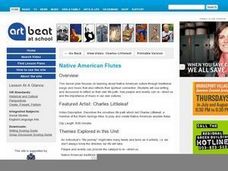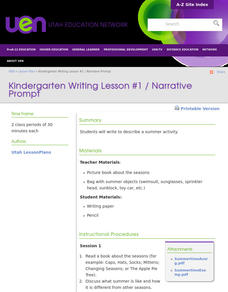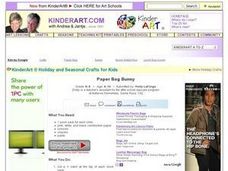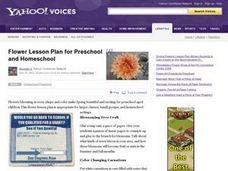Curated OER
Language Arts: Twinning At-Risk Students
Students at-risk in high school and primary grades pair up to read and write together. They create books modeled after authors and illustrators. They hold a parents' day to display their completed books.
Curated OER
Chinese Landscape Painting
Third graders learn about Chinese poetry and landscape paintings, then create their own. They view several examples and discuss the elements of each, then paint their own landscape inspired by what they saw. They then listen to, read,...
Alabama Department of Archives and History
Alabama Farm Life in the Great Depression
The Great Depression not only impacted city folk and factory workers, it also had a profound effect on farmers. Young historians examine primary source materials that document the struggles of Alabama farmers during this time and...
Curated OER
Reader Response
Fifth graders reflect upon different concepts of Language Arts while reading literature. In the novel Tuck Everlasting, by Natalie Babbitt, the characters discover a spring of eternal youth. After reading the first several chapters of...
Curated OER
Native American Flutes - Activity 1
Students discuss Native American culture and musical techniques after viewing a video of Charles Littleleaf, a member of the Warm Springs tribe and a creator of Native American wood flutes.
Curated OER
Kamishibai Stories
Students explore kamishibai stories, Japanese stories told through illustrated picture cards, and become familiar with their form. Afterward, they develop their own illustrated kamishibai story. Students discuss the process of drawing,...
Curated OER
Kindergarten Writing: Narrative Prompt
What is special about summer (fall, winter, or spring)? Using a bag filled with season-related items (for summer items like sunglasses, a swimming suit, etc.) the class take turns taking out one item. A discussion of how each item might...
Curated OER
Guided Reading: Three Little Pigs (Plus Wolf: Javalinas)
Guide your class through reading various versions of The Three Little Pigs. Talk about the traditional story line and then discuss a different point of view: Maybe the wolf was just an innocent bystander! This lesson plan, which has...
Curated OER
Shamrock Fun
Students create small shamrock replicas using green and white paints, paper, bubble wrap, and gold glitter. This lesson intended for the early-elementary classroom is ideal for celebrating St. Patrick's Day or spring-time in general.
Curated OER
Paper Bag Easter Bunny
Learners create paper bag versions of the Easter Bunny in this spring time lesson plan for the Kindergarten to 6th grade classroom. Included with the lesson plan are step-by-step instructions for successful implementation and a short...
Curated OER
Flowers
Learners create flowers out of coffee filters, green construction paper, pipe cleaners, scissors, and glue in this quick and easy pre-Kindergarten lesson plan for Spring time. The lesson plan is broken down into six short steps with...
Curated OER
My Antonia: K-W-H-L Strategy
Use the well-known KWHL chart as a tool for building up to a research project and oral presentation related to Willa Cather's My Antonia. Starting with a class brainstorm, pupils research and gradually narrow down topics relating to...
University of New Mexico
Educating Culturally and Linguistically Diverse Students
Three mini units make up one large unit designed to explore multiculturalism and encourage cultural identity. Each instructional activity sparks thoughtful discussion, critical thinking, and are equipped with activities and assignments...
Curated OER
Easy Easter Crafts
Young scholars make different crafts to represent spring and Easter. In this crafts lesson plan, students make cookies, nests, and bunnies out of their hands.
Curated OER
Spring Art Activities
Students complete a variety of art projects to celebrate the arrival of spring. They create symmetrical butterfly designs, paper mache eggs, and caterpillars, and complete a crayon resist and marble painting.
Curated OER
Spring Slide Show
First graders work cooperatively to create a sprintime poem, slide show and book entitled "Who Said It's Spring?"
Curated OER
Spring Egg
First graders create a spring egg out of pastels, construction paper and glue, create and continue a pattern, and experience a different type of art media.
Curated OER
Time Capsule
First graders collect data in the fall and again in the spring. they use the data from both seasons to compare and contrast changes over time. They put the data from the fall into a box or "time capsule." The teacher encourages students...
Anti-Defamation League
The Name Jar: Discussion Guide for Grades Pre-K–1
A lesson spotlights the story, The Name Jar, by Yangsook Choi. After a read-aloud, the class retells the story using puppets or dress-up. They participate in a thoughtful discussion about the story, answer questions relating the...
Curated OER
Horse Sculpture (or animal of choice)
After a discussion on horse in art and a presentation on safety techniques using materials, students construct a horse sculpture (or other animal of their choice) from sticks and natural fibers.
Curated OER
Identifying Setting and Completing a Story Map
Second graders complete a story map for Frog and Toad Are Friends. In this making inferences lesson students find specific details from the book to complete their story map. They map one chapter at a time.
Curated OER
Searching the World Wide Web for Rudy Autio
Students research Rudy Autio. In this research lesson students maneuver through the Internet to better understand the artist Rudy Autio. They examine his background, educational experiences, art production, influences, and style.
Curated OER
How Poets Evoke Social and Historical Representations
Students explore how poems represent the social, historical, and cultural times that they were written in. In this poetry lesson plan, students compare and contrast poems with music of the time and explore implications of writing poems...
Curated OER
Follow The Road to Riches
Students examine the various events occurring at the time of the Gold Rush. They see archival photographs and hear historians talk about this era. They create a time line in order to facilitate thinking about this region during the...

























